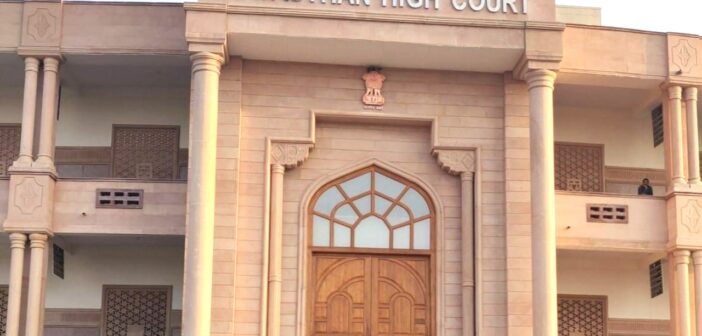In this edition of Court Judgements, we look at the Supreme Court’s decisions of misuse of Preventive detention laws, and imposition of conditions while granting bail, Delhi High Court’s judgement on cruelty to wife by husband, Madhya Pradesh High Court’s judgement on Live-in relationships, and Rajasthan High Court’s judgement on withholding of retirement benefits.
Supreme Court: Inability to address the law-and-order issues should not serve as a justification for resorting to preventive detention measures.
In Nenavath Bujji etc., vs. The State of Telangana and Ors., the apex court took a note of series of cases emerging from the State of Telangana on the invocation of Preventive Detention measures and noted that the inability of the police machinery to tackle the law-and-order situations should not be a justification for resorting to preventive detention measures.
The three-judge bench of the apex court comprising Chief Justice of India, Justice JB Pardiwala and Justice Manoj Misra, was hearing an appeal against the judgement of the Telangana High Court, which declined to interfere with the order of preventive detention on the appellant passed by the Commissioner of Police, Rachakonda Commissionerate, State of Telangana. The brief facts of the case are as follows: the appellant was termed as ‘Goonda’ under section 2(g) of the Telangana Prevention of Dangerous Activities Act, 1986. The allegations were that the appellant was involved in multiple property theft offences in quick succession, thereby creating an atmosphere of panic and fear in the people’s minds. The Detention authority and the Telangana High Court were satisfied that the activities of the appellant detenu were prejudicial to the maintenance of public order, hence it was felt necessary that the appellant be preventively detained.
The counsel for the appellant contended that the cases in which the appellant was involved were typical “law and order” scenarios, and that bail was granted in each of them. The appellant’s right to liberty under Article 21 is restricted when preventive detention is used, and it is neither the most appropriate nor the least restrictive way to stop the appellant from committing new crimes. The respondent’s counsel contended that the contested rulings were error-free.
Upon hearing both sides, the apex Court stated that the power under any statute relating to preventative detention must be applied with extreme care, caution, and restraint. Preventive detention is a preventative power that is applied with reasonable foresight. Failure on the part of police machinery to address ‘law and order’ situations should not be a reason for invoking preventive detention.
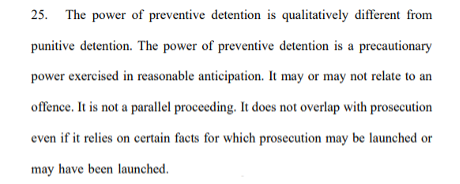
Further, the court distinguishes ‘law and order’ and ‘public order’. It stated that the fundamental difference between the realms of law and order and public order is not solely defined by the nature or quality of the act, but rather by the magnitude and scope of its impact on society. Additionally, the court also relied on Ameena Begum vs. State of Telangana and Others, wherein it looked at whether there was a proper application of mind while ordering detention.
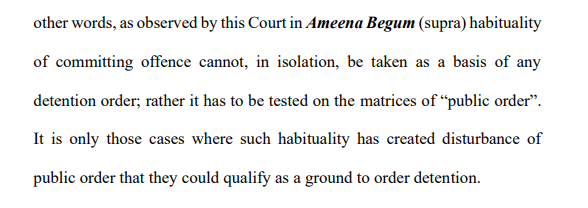
The apex court also issued several measures that must be followed when passing a detention order. Taking an exception to the series of cases of preventive detention from Telangana, the apex court expects that the State of Telangana considers these directives seriously and ensures that orders for preventive detention are not issued routinely without careful consideration. Accordingly, the detention order is set aside.
Supreme Court: Bail conditions breaching fundamental rights can’t be imposed.
In Siba Shankar Das vs. State of Odisha and another, the apex court held that any imposition of bail conditions that breach fundamental rights should not be imposed.
The two-judge bench of the apex court comprising Justice B.R. Gavai and Justice Sandeep Mehta was hearing an appeal against the order passed by the High Court of Orissa that imposed conditions on bail. The order prohibited the appellant, who is a politician, from engaging in political activities. This was appealed by the appellant.
The apex court agreed with the reasoning of the appellant and held that any condition imposing fundamental rights cannot be imposed.
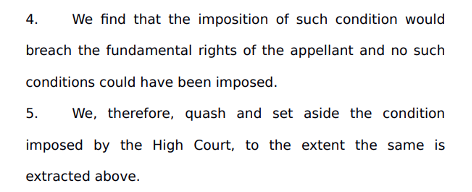
Accordingly, the condition is quashed and set aside.
Delhi HC: Forcefully asking the wife to do household chores if health and any other circumstances does not permit, amounts to cruelty.
In X vs. Y, the Delhi High Court held that allegations which assassinate the character of the spouse amount to the highest level of cruelty, and forcing the wife to do household chores even if her health or any other circumstances do not permit amounts to cruelty.
The division bench of Delhi High Court comprising Justice Suresh Kumar Kait and Justice Neena Bansal Krishna was hearing an appeal against the judgement of the Family Court that dismissed the husband’s petition seeking divorce. The brief facts of the case are as follows: The appellant-husband and respondent-wife married on 6 May 2011, according to Hindu rituals and a boy was born out of wedlock. His marriage has been troubled since its inception due to the respondent’s disregard for him and his family. He said that the responder was quarrelsome and uncooperative, as she did not participate in daily duties or contribute financially to household expenses while being employed. Their marriage bond deteriorated more following the birth of their kid due to respondents’ strong possessiveness about their child and her frequent visits to her mother’s residence. Despite the best efforts, the respondent was reluctant to cohabitate, and disrespectful, thereby inflicting mental cruelty. The respondent, however, asserted that it was she, who was subjected to cruelty by mistreatment, persistent dowry demands and humiliation. The respondent further claimed that she was forced to do household chores immediately after the delivery of the child, which however, fell flat during cross-examination, as there was a maid servant hired.

Further, there was no evidence on record for the allegations of the wife about the husband having extramarital affair. The hue and cry made by the wife at the husband’s workplace tarnished the image of the husband.
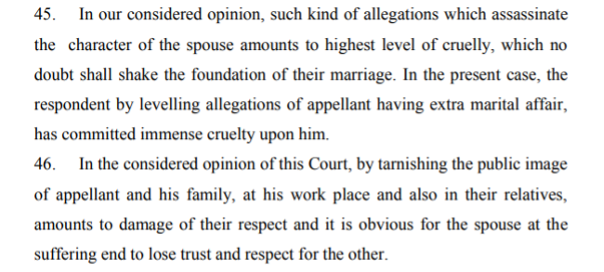
Considering the facts of the case, the Delhi High Court set aside the order of the Family Court, and the union between the parties is legally dissolved in accordance with the provisions outlined in Section 13(1)(ia) of the Hindu Marriage Act, 1955.
Madhya Pradesh HC: Youngsters must exercise caution on getting into live-in relationships.
In a recent judgement, the Madhya Pradesh High Court, though granted protection to a young live-in pair – both the boy and the girl were 19 years old – cautioned against young people entering into partnerships and abandoning their families at such a young age.
The single judge bench of Justice Subodh Abhyankar was considering a petition filed seeking protection as they were residing together against the wishes of their parents and were anticipating untoward actions by the parents. They had relied on the apex court judgement in Nandakumar vs. State of Kerala, wherein the apex court held that even though the petitioners were not competent enough to enter into wedlock, they had the right to live together outside the wedlock. However, the counsel for the state argued that granting such protection would not be in the larger interest of society and may encourage promiscuousness.
Having heard both sides, the court was inclined to grant protection from external forces. At the same time, the court also recorded its caution against the choices youngsters are making these days. Though some rights are guaranteed by the Constitution of India, it is not necessary to enjoy them.
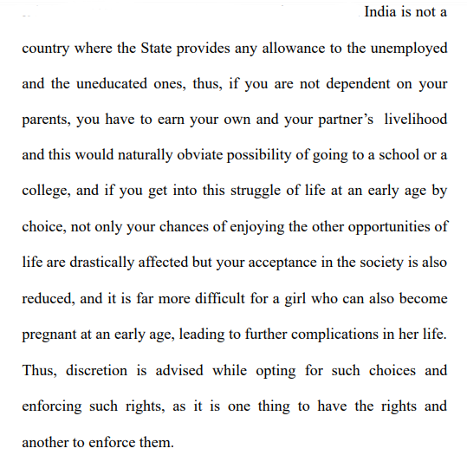
Accordingly, the court granted protection to the petitioners.
Rajasthan HC: Withholding retiral benefits amounts to depriving the right to life; cannot be withheld for proceedings related to non-official duties.
In Mahesh Chandra Soni vs. State of Rajasthan & Ors., the Rajasthan High Court held that retirement benefits cannot be withheld due to processes unrelated to official duties, such as family disputes. Depriving them amounts to depriving the right to life.
The single-judge bench of the Rajasthan High Court headed by Justice Ganesh Ram Meena was hearing a petition against the order of the Assistant Director, Pension and Pensions Welfare Department, that withheld the payment of pension of the petitioner. The basic facts of the case are as follows: the petitioner was appointed to the post of Male Nurse Grade-II in January 1985. The petitioner was promoted to the post of Male Nurse Grade-I in 2008. The petitioner was retired from service in 2023. During the service, the petitioner was charge-sheeted under offences under sections 498A and 406 of the IPC and sections 4 & 6 of the Dowry Prohibition Act, 1961, and the trial is pending before the trial court. Further, on allegations of misconduct, the Director, Medical and Health Services, Rajasthan initiated departmental enquiry and closed the case based on the recommendations of the enquiry committee. Post this, the Assistant Director directed the treasury to stop the retirement benefits payments.
The counsel for the petitioner argued that the petitioner is facing financial hardships. The criminal cases are on fabricated facts and denying retirement benefits is violative of the right to life. The counsel for the state argued that withholding of retirement benefits is in accordance with Rule 90 of the Rajasthan Pension Rules, 1996.
Upon hearing both sides, the Rajasthan High Court held that the pension rules clearly provide that the payment of pension and gratuity are on the basis of service rendered and they cannot be withheld because of proceedings that do not relate to official duties. It is not a bounty but constitutes a right to property.
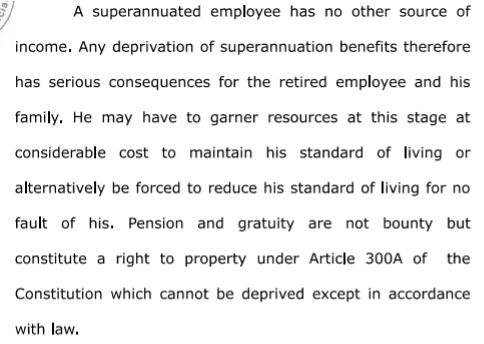
The court further relied on multiple judgements, wherein the courts have reiterated to consider whether the charges levelled are related to the performance of official duties.
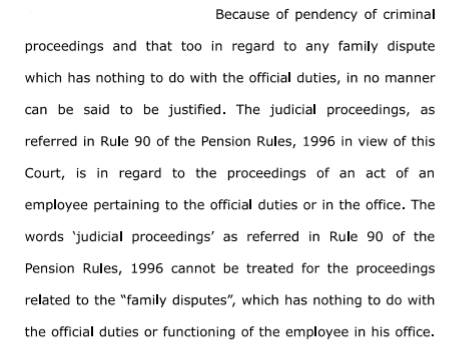
Accordingly, the order passed by the Assistant Director is set aside and the respondents are directed to allow the payment of retiral benefits.


